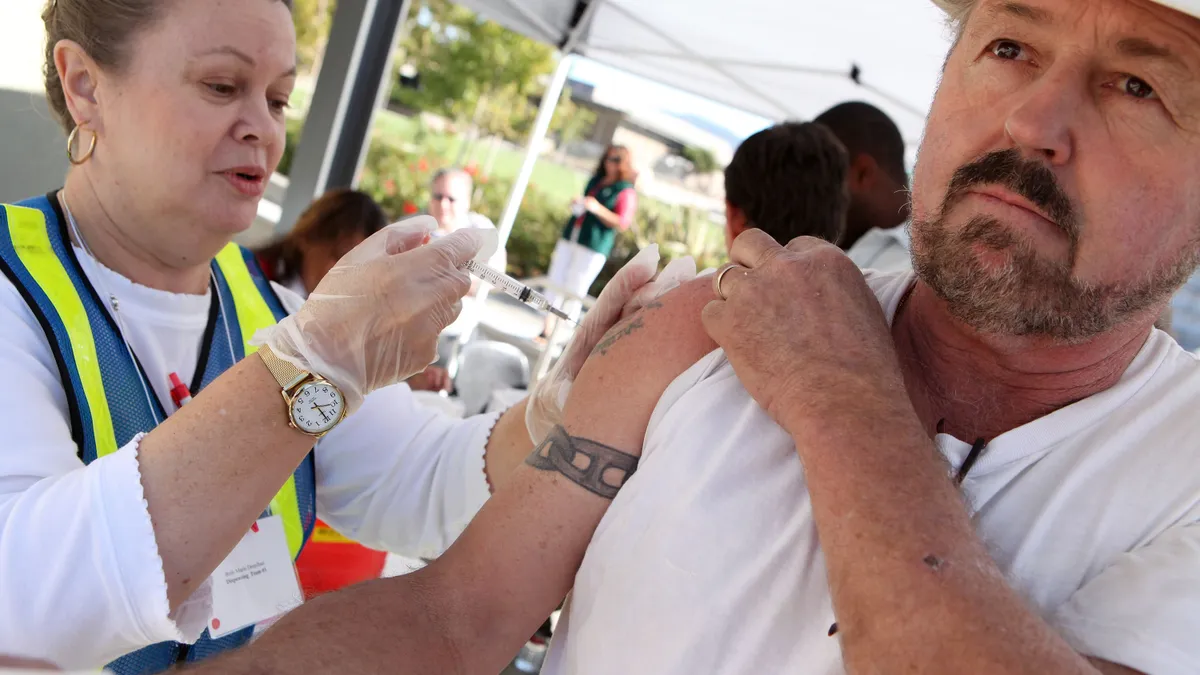UPDATE: Feb. 7, 2022: A federal judge dismissed the claims in a lawsuit filed by several contractor groups over the city of Denver's vaccine mandates on Friday, citing "deficiencies" in the plaintiffs' arguments about any actual damages the companies have suffered as a result of the mandates.
The plaintiffs in the lawsuit were:
- Colorado Contractors Association
- Colorado Stone, Sand, & Gravel Association
- Colorado Ready Mixed Concrete Association
- Colorado Motor Carriers Association
- Colorado Asphalt Pavement Association
- Hispanic Contractors of Colorado
- Rocky Mountain Mechanical Contractors Association.
U.S. District Court Judge Christine Arguello wrote in the ruling that while the plaintiffs highlighted the resources that they would have to expend in order to enforce the vaccine mandate and the potential penalties they would receive from being unable to comply, the plaintiffs failed to prove that there would be any harm to their businesses from the mandate.
"Aside from vaguely referencing being 'under threat of criminal, civil, and administrative penalties' if they do not timely comply with the order, plaintiffs fail to allege a credible threat of enforcement sufficient to establish injury in fact," wrote Arguello in the order.
Arguello gave the plaintiffs 30 days to amend their case, or, she said, the dismissal will stand.
Dive Brief:
- Alleging that vaccine mandates for contractors are unconstitutional, the Colorado Contractors Association is suing the city of Denver for requiring workers on public contracts to get inoculated against COVID-19.
- In a filing in the federal U.S. District Court for Colorado, the CCA and six other construction associations argued that the mandate violates the U.S. Constitution's contracts clause because it substantially impairs firms' existing contract rights with the city.
- Tony Milo, executive director of the CCA, said the organization is not anti-vaccine, but that Denver's mandate is too restrictive compared to President Joe Biden's executive order that companies with 100 employees or more must require vaccinations or have employees submit to regular testing. "Our members are pro vaccine," Milo told Construction Dive. "We've met with Denver officials and suggested mirroring the Biden plan, which is much more doable. But they flatly rejected all of our requests."
Dive Insight:
A spokesperson for the Denver City Attorney's Office declined to comment, citing a policy of not speaking publicly about ongoing litigation. The trade associations expect the city to fine companies as much as $5,000 per day if they are not in compliance, according to the lawsuit.
Denver Mayor Michael B. Hancock, who is named in the suit, issued the vaccine mandate on Aug. 2, with a deadline of Sept. 30 for compliance. The order covers city employees and contractors as well as health care, correctional and education workers.
Milo said contractors weren't given enough time to comply, due to the elevated rates of vaccine hesitancy among construction workers. According to CPWR, a not-for-profit group focused on construction safety, just 57% of construction workers are vaccinated, compared to 80% for all other industries. In Colorado, that number is 64.9%.
"We've got a large Hispanic and minority workforce, and it's been challenging for us as employers to inform workers with the facts about the safety and effectiveness of the vaccine," Milo said. "We're continuing to work on it, but it's going to take some time."
According to the Bureau of Labor Statistics, at the national level, 88.6% of construction workers identify as White, while 30% are Hispanic or Latino, a measure of ethnicity, not race.
The CCA's lawsuit argues that "up to half of the employees in the construction industry are vaccine hesitant — not because, as may be argued, they have some political opposition, but because the construction industry is largely made up of communities of color who are vaccine hesitant due to mistrust of the government."
A labor issue
Milo said the mandate effectively requires companies to fire hard-to-replace workers who aren't vaccinated. "If we lose any workers due to these vaccine mandates, there's nobody to replace them," Milo said. "We're going to have to figure out how to do projects, which is going to increase costs of projects. It's going to increase the time that it's going to take to do these projects."
The lawsuit represents a tangible pushback on vaccine mandates in construction, which larger construction associations have also raised concerns about. But it also represents the fine line construction firms must walk while encouraging workers to get vaccinated, while at the same time lobbying against vaccine mandates.
For example, the Associated Builders and Contractors reacted to OSHA's forthcoming Emergency Temporary Standard focused on COVID-19 vaccinations for workers.
“Despite the efforts of a range of stakeholders, vaccine hesitancy remains an ongoing, complicated reality in countless industries," said Ben Brubeck, ABC vice president of regulatory, labor and state affairs, in a statement. "How the ETS is crafted will have significant, lasting impacts by driving workers away from larger firms and disrupting construction projects without raising the vaccination rate."
Neither the ABC, nor the Associated General Contractors of America's Colorado chapter, which have also advocated for construction workers to get vaccinated, were parties to the Colorado lawsuit.
Vaccine hesitancy isn't limited to the U.S. construction industry. In Australia, the government recently shut down Melbourne construction sites when demonstrations against vaccine mandates for construction workers turned violent.















